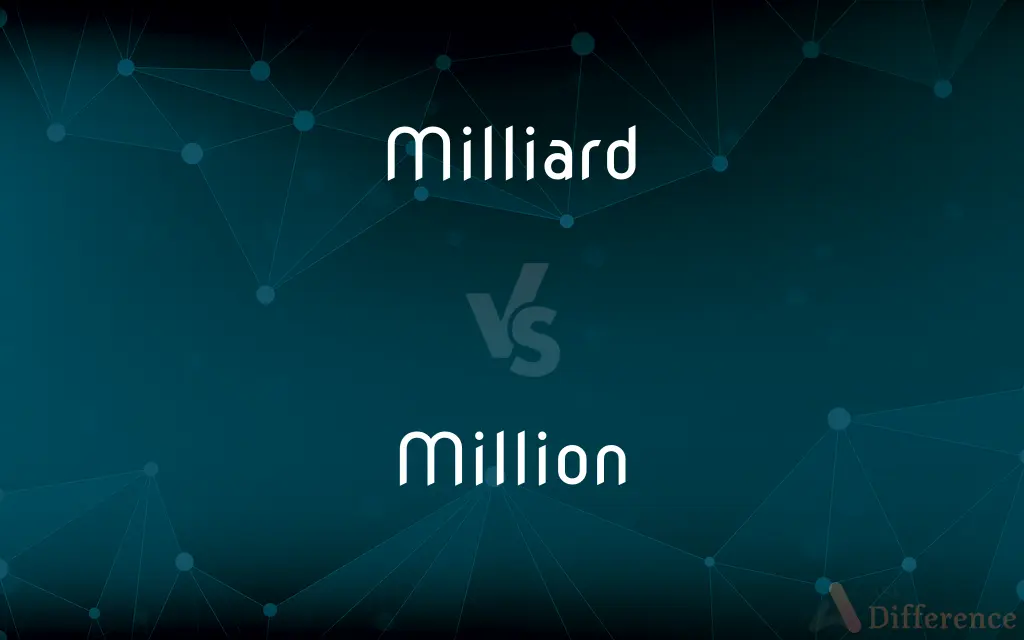Milliard vs. Million — What's the Difference?
By Tayyaba Rehman & Fiza Rafique — Updated on March 29, 2024
A milliard represents 1 billion (1,000,000,000) in some non-English-speaking countries, while a million signifies 1,000,000 universally.

Difference Between Milliard and Million
Table of Contents
ADVERTISEMENT
Key Differences
A milliard is a term used in some non-English-speaking countries to denote the number 1,000,000,000, following the long scale numbering system. On the other hand, a million is a universally recognized numerical value representing 1,000,000, following both the long and short scale numbering systems.
While the concept of a milliard is primarily found in languages and countries that adhere to the long scale, such as in parts of Europe, a million is a standard numerical figure in the international and English-speaking world, utilized in both financial and scientific contexts.
In the long scale system, a milliard comes right before a billion, which is defined as 1,000,000,000,000 (a million million). Whereas, in the short scale system, prevalent in English-speaking countries and others, a million directly precedes a billion, with no milliard in between.
The usage of milliard helps in distinguishing between the two scales, providing clarity in large-number naming conventions in certain languages. Conversely, the term million is versatile and consistent across various fields such as mathematics, finance, and general counting in English.
Despite the clear numerical value of a million, the concept of a milliard might cause confusion among those not familiar with the long scale numbering system. Meanwhile, million enjoys universal understanding and application, making it a fundamental part of numerical literacy worldwide.
ADVERTISEMENT
Comparison Chart
Numerical Value
1,000,000,000
1,000,000
Scale System
Long scale
Universal (both long and short scale)
Prevalence
Non-English-speaking countries
Worldwide
Position Before Billion
Directly before in long scale
Directly before in short scale
Usage
Specific to certain languages/countries
Universal in various contexts
Compare with Definitions
Milliard
Reflects cultural differences in numerical naming conventions.
The usage of milliard versus million highlights differing international approaches to number scales.
Million
A numerical value representing 1,000,000 in both the long and short scale numbering systems.
The lottery jackpot reached ten million dollars.
Milliard
A numerical value representing one billion in the long scale numbering system.
The population of India is over a milliard.
Million
Directly precedes a billion in the short scale numbering system.
After a million comes a billion in the U.S. numbering system.
Milliard
Used in specific non-English-speaking countries to denote 1,000,000,000.
Some European countries officially use milliard for their financial reports.
Million
Essential for numerical literacy and communication worldwide.
Understanding the concept of a million is crucial in global finance.
Milliard
The term preceding billion in countries using the long scale.
A milliard euros is a significant amount of money in any currency.
Million
Universally recognized and used in various contexts, including finance and science.
Over a million species of insects have been identified.
Milliard
Not commonly used in English-speaking countries.
The term milliard might confuse some English speakers unfamiliar with it.
Million
A fundamental unit in large number counting in English.
A million seconds is about 11.5 days.
Milliard
The cardinal number equal to 109.
Million
The cardinal number equal to 106.
Milliard
109, a thousand (times a) million. (Now generally replaced by the short scale billion.)
Million
A million monetary units, such as dollars
Made a million in the stock market.
Milliard
A thousand millions; - usually called billion in the United States. See Billion.
Million
Often millions An indefinitely large number
Millions of bicycles on the road.
Milliard
A billion;
In England they call one thousand million a milliard
Million
Often millions The common people; the masses
Entertainment for the millions.
Million
The cardinal number 1,000,000: 106; a thousand thousand.
Million
An unspecified very large number.
I told you a million times before.
I can think of millions of reasons not to go.
Million
The number of ten hundred thousand, or a thousand thousand, - written 1,000,000. See the Note under Hundred.
Million
A very great number; an indefinitely large number.
Millions of truths that a man is not concerned to know.
Million
The mass of common people; - with the article the.
For the play, I remember, pleased not the million.
Million
The number that is represented as a one followed by 6 zeros
Million
(in Roman numerals, M written with a macron over it) denoting a quantity consisting of 1,000,000 items or units
Common Curiosities
What does a million stand for?
A million represents the numerical value of 1,000,000 in both the long and short scale numbering systems.
Is milliard the same as a billion?
Yes, in countries using the long scale system, a milliard is the same as one billion in the short scale system, both representing 1,000,000,000.
How many zeros are in a milliard?
A milliard has nine zeros (1,000,000,000).
How is a million used universally?
A million is used universally in various contexts, including finance, science, and general counting, representing 1,000,000.
What is a milliard?
A milliard is a term used in some non-English-speaking countries to represent 1,000,000,000, equivalent to one billion in the long scale system.
Why don't English-speaking countries use the term milliard?
English-speaking countries prefer the short scale numbering system, where the term billion directly follows a million, eliminating the need for milliard.
How does the usage of milliard reflect cultural differences?
The usage of milliard versus million in numbering systems reflects cultural and linguistic preferences in numerical naming conventions.
Is milliard recognized by international standards?
While not commonly used in English, milliard is recognized and used according to the long scale system in various parts of the world.
How are milliard and million taught in schools?
This depends on the country and its numbering system preference; milliard may be taught in long scale countries, while million is universally taught.
How does the concept of a milliard affect international financial reporting?
It requires clear communication and conversion between long and short scale systems for accurate financial reporting and understanding.
What is the significance of knowing the difference between milliard and million?
Understanding the difference is crucial for accurate interpretation of large numbers, especially in international contexts.
Can a milliard and a million be used interchangeably?
No, they represent different numerical values and are used in different numbering systems.
What is the numerical difference between a milliard and a million?
A milliard is 1,000 times larger than a million.
How has the use of milliard and million evolved over time?
The use of these terms has evolved with the adoption of standardized numbering systems, with milliard becoming less common in English-speaking countries.
What role does a million play in mathematics?
A million is a fundamental unit in counting large numbers and is essential for mathematical literacy and calculations.
Share Your Discovery

Previous Comparison
Perl vs. Lisp
Next Comparison
Lookdown vs. MoonfishAuthor Spotlight
Written by
Tayyaba RehmanTayyaba Rehman is a distinguished writer, currently serving as a primary contributor to askdifference.com. As a researcher in semantics and etymology, Tayyaba's passion for the complexity of languages and their distinctions has found a perfect home on the platform. Tayyaba delves into the intricacies of language, distinguishing between commonly confused words and phrases, thereby providing clarity for readers worldwide.
Co-written by
Fiza RafiqueFiza Rafique is a skilled content writer at AskDifference.com, where she meticulously refines and enhances written pieces. Drawing from her vast editorial expertise, Fiza ensures clarity, accuracy, and precision in every article. Passionate about language, she continually seeks to elevate the quality of content for readers worldwide.














































